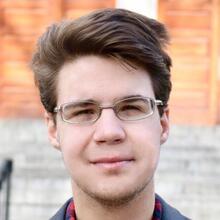Thousands crowded the Cathedral Church of St. John the Divine in Morningside Heights in New York City on Nov. 21 to honor the author Toni Morrison. Ms. Morrison, who died Aug. 5 in New York City, received the Nobel Prize in Literature in 1993. Her fifth novel, Beloved, earned her the Pulitzer Prize in fiction in 1988 and a decade later was adapted into an Academy Award-nominated film.
For her contributions to American letters, contributions that included frequent, challenging explorations of racism, oppression and the black experience in the United States, President Barack Obama awarded Ms. Morrison the Presidential Medal of Freedom in 2012.
At a public memorial service in the cathedral, the site of the funerals of James Baldwin and Duke Ellington, several friends of Ms. Morrison provided their recollections of her talent, warmth and sense of humor.
David Remnick: "Toni Morrison’s novels are not only about subjects—about race and its construction, about family and community, friendship and love, about all that is human—they are also exquisitely built."
David Remnick, the editor of The New Yorker, remarked on her literary brilliance and artistry with the written word. “Toni Morrison’s novels are not only about subjects—about race and its construction, about family and community, friendship and love, about all that is human—they are also exquisitely built,” he said. “They’re like music. They’re as intricately structured as an Ellington suite.”
Her writing, especially in her 1977 novel Song of Solomon, is infused with spirituality and scriptural references. Ms. Morrison, who was born in 1931 into the African Methodist Episcopal Church, converted to Catholicism during childhood. “[A] mash-up of mainstream Christianity and African-American spiritual traditions shaped Morrison in her personal and professional life alike,” wrote Nadia Nittle in a 2017 article for America.
“She is no mere great American writer,” said Erroll McDonald, the vice president and executive editor of Knopf Doubleday and a publisher of Ms. Morrison’s works. “A free artist of herself, she is a world historical figure, a towering presence in the world republic of letters who has had a seismic impact on the global economy of literary prestige.”
“She was my big sister—a friend who made me feel that, without her friendship, I could never have become who I imagined myself to be today,” said the author and activist Angela Davis.
In addition to praise for her writing, speakers also spoke of their personal relationships with the late writer.
“She was my big sister—a friend who made me feel that, without her friendship, I could never have become who I imagined myself to be today,” said the author and activist Angela Davis.
Ms. Davis related how Ms. Morrison was not herself an activist but aimed to “make sure that there was a published record of those who did march and did put themselves on the line,” as she told Hilton Als of The New Yorker in 2003.
Oprah Winfrey, whose book club selections included several Toni Morrison novels like Paradise and The Bluest Eye, referred to Ms. Morrison as “one of our most influential public intellectuals.”
Oprah Winfrey, whose book club selections included several Toni Morrison novels like Paradise and The Bluest Eye, referred to Ms. Morrison as “one of our most influential public intellectuals.” Ms. Winfrey first met the author in the early 1990s at the home of the poet Maya Angelou. “My head and my heart were swirling,” Ms. Winfrey said of her first encounter with the author. “Everytime I looked at her—I mean, I couldn’t even speak. I had to catch my breath.”
A testament to the far-reaching impact of Ms. Morrison’s works, the tribute also featured an array of international speakers, including the Haitian-American author Edwidge Danticat and the Sri Lankan-born Canadian novelist Michael Ondaatje. “She’s much more than an American writer,” said Mr. Ondaatje. “She’s universal.”
Speeches were interspersed with music, with performances from guitarist and singer Toshi Reagon, saxophonist David Murray, harpist Brandee Younger and veteran jazz vocalist Andy Bey. Mr. Bey concluded the ceremony at the piano with his soulful performance of the George and Ira Gershwin standard, “Someone to Watch Over Me.”
The back of the event program displayed a fitting quotation, now a poignant final word from Ms. Morrison’s 1993 Nobel Prize lecture. “We die. That may be the meaning of life. But we do language. That may be the measure of our lives.”










